#why do psp games excel at making text so hard to read
Explore tagged Tumblr posts
Text
For @mejomonster, here’s my overly long analysis of the way I approach studying language while playing video games. I thought this was going to be a relatively short answer, but there are actually a lot of factors involved.
The games I have played in Japanese, fall into two categories: 1) do not have a localization, and 2) have a localization but I still purchased and play the Japanese version.
The games that did not have a localization when I picked them up were: Fire Emblem: If, Fire Emblem: New Mystery of the Emblem, Akaya Akashiya Ayakashino, and Taisho Mebiusline.
Fire Emblem If (FE: If) was a special case because this was my transcription/translation project in which I had to look up every single word I did not know, which was excruciating but the game that improved my Japanese the most. There was no crutch available, just me, one year of formal language lessons that mostly focused on conversation, and an online dictionary (jisho.org is the best j-dictionary I’ve found). No game since has really helped me develop my language skills more than FE: if. It helped that I had a translation partner, so I could later skim and see if I had gotten the right impression from the text. I didn’t really read her translations that deeply though. I still play this game in Japanese and never once looked up the localization. Even if I don’t know a word, I just infer or if I’m super curious, I look it up in the dictionary.
Fire Emblem: New Mystery of the Emblem is the sort of story where I would definitely have played it right alongside the translation, if a (complete) translation existed at the time I played it. This storyline is really simple and to me, not worth the effort of having the dictionary at my side. I powered through the lines I didn’t know, only looking up a word if it appeared often. Now that a fan translation exists, I would probably play it alongside the English because this game has so much text and none of it is really that intriguing that I feel compelled to pull the dictionary out.
Akaya Akashiya Ayakashino is a visual novel. It has a fan translation, but it’s a game that I feel is best experienced in its original language due to its themes. It’s a lovely game. I ignored the existence of the translation and just read it with a dictionary at my side. Very hard to get through visual novels though, especially if you aren’t that good at the language yet.
Taisho Mebiusline is…a notoriously difficult visual novel for native Japanese readers. A fan translation exists of the common route. I do read the translation first before playing this game. After reading the translation, I then try to tackle the game myself without the translation at my side. I do play this with a dictionary to get most out of my learning (but keeping in mind that this game is really, REALLY literary). I might not look up every word, but I can follow along with the game just fine using this method and I rely on the dictionary more if I’m looking to turn it into a study session rather than just playing the game. I could kind of play it without the translation now, but I’d miss a lot of the nice nuance (the MC is well read and literary, and his narration definitely suits that; I feel like glossing it over and skim reading will give me and understanding of what is said but will make the narrative lose its charm).
The games that I played in Japanese that did have localizations were: Final Fantasy: Type-0, Final Fantasy: Crisis Core, Fire Emblem Echoes: Shadows of Valentia, and Pokemon: Sun.
Let’s get it out of the way now: I gave up playing Pokemon Sun in Japanese after like 15 minutes. It was too hard to get used to all of the attack names and Pokemon is NOT a game I want to spend my time lugging around a dictionary for (figuratively). Pokemon also gets good localizations, there’s not much to mess up, and the game took place in a Hawaii setting. It felt weird experiencing it in Japanese, tbh.
Final Fantasy: Type-0 is my baby. I originally got interested in this game from seeing gameplay on YouTube, so I actually experienced the entire game in English first. The cost of the PS4 was too high for me, so I decided to buy the Japanese version on the PSP. I was not really looking to practice my Japanese, I just wanted to play this game lol. Anyways, people made some really helpful guides for the PSP version, so those were the only “translations” I referred to from there on out. I did know the basic story beats from the gameplay videos but it had been several months since I saw them. I also looked up some old translations from back when the PSP was the only version, and it helped me learn some stuff since the fan translations are always more literal and less localized. I only picked up a dictionary occasionally.
Type-0 led me to another translation project which helped my language skills immensely but…that’s a story for another time.
Final Fantasy: Crisis Core is a game I also watched all of the cutscenes of before playing it in Japanese. Honestly this game is really fun and I wish I could have played it in English instead because Final Fantasy games have good localizations...but I played it with a mix of dictionary, my own brain doing the work, and looking up English gameplay because lazy.
Finally, we have the latest game: Fire Emblem Echoes: Shadows of Valentia. I love this game. When it game out, I knew I was going to get the Japanese version even though it was a simultaneous release and you can toggle Japanese voices in the English version. Mainly because FE: If had a sketchy localization (and I wasn’t fond of Fire Emblem Awakening’s changes either) and I was afraid for this game. I also wanted to practice my Japanese, which got rusty, and this was the PERFECT game to do so since it was fully voiced.
Turns out, Echoes has an excellent localization and I’m happy to hear it. But I never looked it up, I just relied on my own skills and the dictionary. This one would have really helped me not Suffer so much if it came out when I was starting to study the language because it’s really, really nice to have voiced lines with the Japanese scrolling. Japanese media doesn’t really give Japanese subs unless it’s like…a variety show or something, which I don’t watch. This is why my reading ability has always lagged behind my listening ability.
So yeah LONG STORY SHORT: it heavily depends on the game. If I love it, I will sit there with a dictionary and comb through every line of dialogue even if a localization exists for it. If its language is special in some way - literary, strong shinto influences - then I’ll also experience it without a translation to the best of my ability. If the language is beyond my ability to understand, I’ll grudgingly rely on a translation. If I’m lazy, if the story isn’t that engaging and the amount of text is too much, I will just play it without attempting to look anything up (and if it HAD a localization…I would buy it without hesitation). Voiced games are a god-send and I wish I had more of them.
Fire Emblem games are some of my favorite of all time, but I do have to say, if I had access to both English + Japanese scripts, I would actually read the English first and skim read the Japanese out of curiosity to see if anything changed. They just have too much text. I can play any of them in Japanese just fine, but I actually prefer to play them in English IF the English localization doesn’t infuriate me.
14 notes
·
View notes
Text
#13: 月影の鎖 -錯乱パラノイア- / Getsuei No Kusari - Sakuran Paranoia -
Released in April of 2013, Getsuei no Kusari ~ Sakuran Paranoia ~ is an otome game for the PSP. Developed and published by TAKUYO, GnS is a sprawling, massive tale about the struggles of a small town facing economic decline, xenophobia, taxation, and despair. There’s also a bit of romance, too. As a treat.
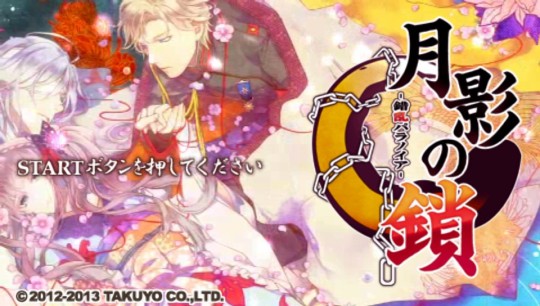
Set in the isle of Sangetsutou, a small island far from the mainland, we play as Fuyuura Megumi, who runs a small restaurant in the island���s only city, Koukashi. Megumi is an excellent protagonist - she’s kind, polite, and very hard-working, but has trouble opening up and asking others for help. Relatable.
But all is not well in this seemingly peaceful town. A massive fire devastated Koukashi a year before the game began, and the town has faced economic issues since. Once known as a tourist destination due to its pleasure quarter and hot springs, the amount of visitors to Sangetsutou has decreased significantly. Faced with economic depression, the town’s unnamed mayor hires a mysterious consultant, Fukami, who offers the town a simple solution: turn the town into a military base. By doing so, Koukashi would not only receive money from the federal government, but businesses, too, would benefit from the presence of soldiers visiting the island and spending their coin. But the majority of the citizens are opposed to this proposal: why should their way of life have to change? Who will really benefit? Is there any other way? What would happen should the country go to war?
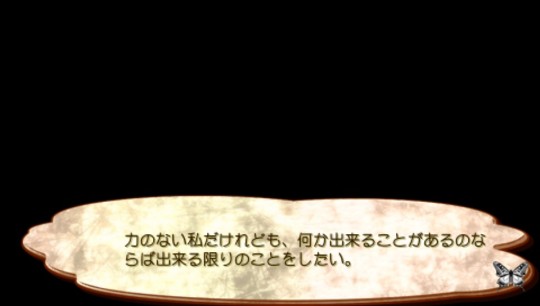
Chief among those opposed to the garrison is Kagurazaka Hibiki, leader of the town’s youth activism group and local hero. Originally a traveler, he happened to be in Sangetsutou during the great fire of last year, and is renowned for stepping in and organizing the rescue and extinguishing movements when the town’s government failed to respond adequately. He is well-educated, stoic but likable, and the town has developed a dependency on him to set things right, for better or worse. Working directly underneath him is Mochizuki Satoya, a diligent youth, who grew up in the pleasure quarters, working as an assistant to the brothels there. Like Kagurazaka, he cares deeply for the townspeople, though he struggles with envy, as he feels he does not have the ability to lead others as Hibiki does. He’s also short. He doesn’t like that, either.

Rounding out the cast, we have Inoguchi Wataru and Haruna Nozomu. Wataru works for the military, and I assume he is involved with the militarization of the town, but beyond that, I’m not sure, as I have yet to do his route. Nozomu is initially silent about his motives, but it is eventually revealed that he works for Fukami, but this cynical blue-haired jokester isn’t especially loyal to this colonizer of a boss.

Unlike other otome games, or at least those that I have played personally, GnK isn’t entirely focused on romance - rather, this is a story of a small town trying to cope with economic struggles, with interpersonal drama sprinkled in throughout each route. Each story-path features Megumi siding with a particular faction within Koukashi: for example, you’ll become a member of Kagurazaka’s activism group in his story-line, while in Mochizuki’s, you’ll spend a great deal of time getting to know the women that make their living as prostitutes in the pleasure quarter. Should you choose Haruna, you’ll spend a brief time working the game’s “villain” of sorts - and if you couldn't guess who that is, it’s Fukami. The world of GnK is a morally grey one - each character is extensively developed, complete with many long, long monologues, both spoken and thought, and you’ll gradually discovery why each character does the things they do, even if you don’t agree with their reasoning. The game respects your intelligence in this respect, and the writers are not afraid to discuss serious issues. This is easily the most “mature” otome game I have played. GnK tackles subjects like xenophobia, racism, economic scarcity, suicide, rape, and the validity of the sex work. Furthermore, this is by far some of the most challenging material I’ve ever read as a non-native speaker of Japanese. This game will break your back if you’re not at a certain level of fluency, but I personally loved the complexity of the text. As somebody who has studied the language extensively, I sometimes feel as though my abilities have plateaued in a sense - almost as if I can’t get any better than my current level. GnK wound up being a rewarding experience solely in that sense - but make sure you keep a dictionary on hand!
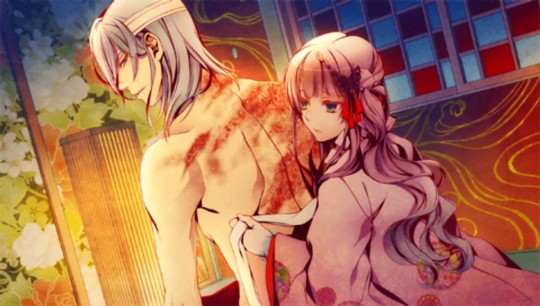
The story, for the most part, is very slow-paced and there’s not much “drama” until the latter half of the game. GnK is a slow-burner, which naturally allows for more opportunities to really explore its characters. However, this does not mean that there’s no filler - there is an absolutely absurd amount of text that I felt could have been left in editing without affecting the story. Do we really need to have multiple paragraphs of Megumi describing, at length, the process of preparing tea every time somebody orders it? I understand that this is a visual novel, so shouldn’t the principle of “show, don’t tell” apply even more in this respect?
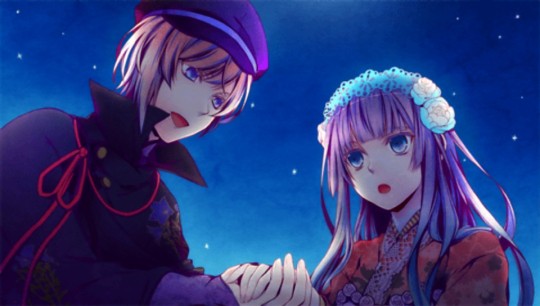
The game is a bit obtuse when it comes to unlocking routes, as well. On my first play-through, I answered each prompt as I would in real life, as I typically do in games of this type, curious to see who I wound end up with in a natural flow of things. This was a stupid idea in hindsight, because GnK has a number of bad endings lurking to sink an unsuspecting gamer. I would up unlocking nobody, and my game ended after only a few hours. Upon reading a guide, I was a little annoyed by how strict the game expects you to be in regards to following each route - but in its defense, GnK does provide an excellent auto-save feature. I was just too dumb to utilize it properly.
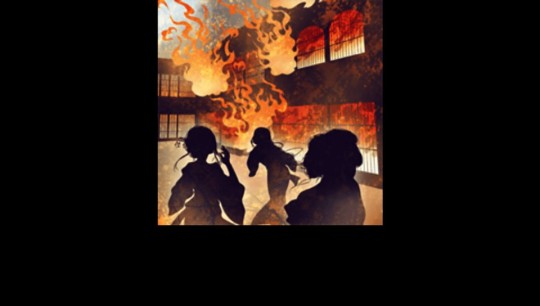
Each protagonist has two “main” endings, and as mentioned above, a small handful of bad ones. Which proper ending you unlock depends on how high the “love” and “dependent” your man of choice has for you. Being self-less, strong willed, and honest tends to raise the “love” meter, while doing the opposite raises the “dependency” level, but it, of course, depends on the character.
The love endings are full of the schmaltz you’d expect from a game of this type, though slightly elevated thanks to the high quality of the writers at Takuyo. The dependency endings, on the other hand, are absolutely wild, and genuinely disturbing - you’ll experience the exquisite pleasure of burning together in the pleasure quarter, or, conversely, know what it’s like to strangle another human being after you’ve lost your marbles due to experiencing the same trauma your birth-mother went through! They are the definition of extra, and as a whole, felt way way more fulfilling and unique compared to the happier endings.

I wish the game had actual split routes for the two ending types, however, as seeing a healthy-ish relationship crumble within a span of minutes felt a little jarring to me, personally. That being said, if you only have time for one ending, go for the dark ones, as they really pack that molasses-drenched punch.

I love when a game manages to truly surprise me, and GnK did that. The plot, grounded and realistic, free from paranormal influences or deus-ex-machina bullshit, felt super fresh compared to many games in the same genre, and the depth of text kept me challenged and entertained. Each route will take about 10 hours - so it’s well worth trying out! Stay safe out there, and happy gaming!
#getsuei no kusari#otome game#otome#visual novel#historical game#playstation portable#psp#gaymer#retro gaming#retro game review
2 notes
·
View notes